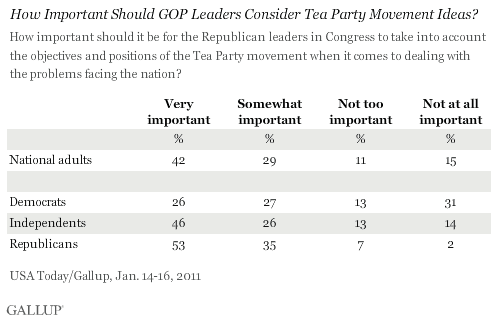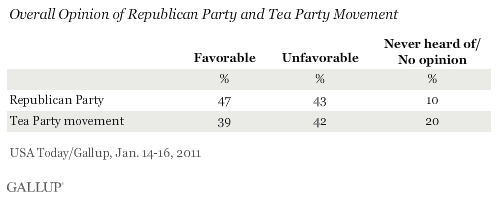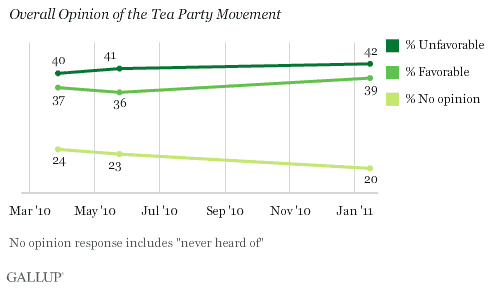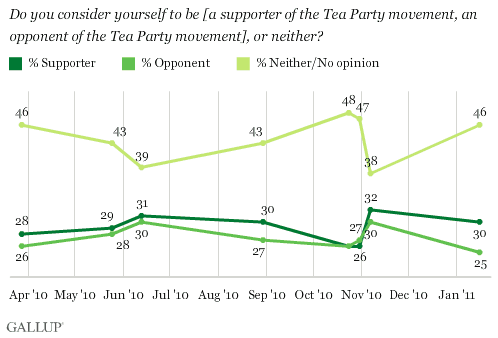PRINCETON, NJ -- About 7 in 10 national adults, including 88% of Republicans, say it is important that Republican leaders in Congress take the Tea Party movement's positions and objectives into account as they address the nation's problems. Among Republicans, 53% rate this "very important."

These results are from a USA Today/Gallup poll conducted Jan. 14-16, prior to President Barack Obama's State of the Union address.
Although few Democrats (6%) are supporters of the Tea Party or even have a favorable view of it (11%), more than half say it is important that the Republican Party take the Tea Party's positions into account. Why this is the case is unclear, although Democrats may simply feel that the opposing party should pay attention to all of its constituencies.
Perhaps underscoring the same principle, Republicans overwhelmingly feel their leaders should take the Tea Party's positions into account, even though barely half are self-identified as Tea Party supporters.
Despite Americans' willingness to have Tea Party voices heard, it is not clear that the Republican Party benefits when Tea Party leaders publicly overshadow its own. Indeed, the GOP confronted that issue last week when Rep. Michele Bachmann's Tea Party-sanctioned response to Obama's State of the Union address seemed to draw attention away from the Republican Party's official response given by Rep. Paul Ryan.
The Republican Party has a somewhat more favorable image nationally than does the Tea Party, and by the widest margin seen over the past year. In the poll, 47% of Americans had a favorable opinion of the Republican Party compared with 39% holding a favorable view of the Tea Party movement.

In contrast to the recently improved ratings of the Republican Party, public opinion of the Tea Party movement has changed little since Gallup's initial measurement in March 2010, with just under 40% viewing it favorably and slightly more viewing it unfavorably.

The percentage of Americans labeling themselves as supporters of the Tea Party movement has also held steady over the same period at about 30%. Currently, slightly more Americans call themselves supporters of the movement than opponents, 30% vs. 25%.

The Bachmann speech highlights the fine line the GOP leadership must walk between Tea Party movement activists and traditional Republicans. About half of Republicans, 52%, say they are supporters of the Tea Party movement. Most others (43%) take no position on the movement, while 5% say they oppose it.
Bottom Line
While media commentators duel over whether Bachmann's response to the State of the Union address deserved prime-time coverage, the Republican Party has its own dilemma: how much deference to show Tea Party activists and their generally conservative proposals in crafting public policy. Almost all Republicans say it is at least somewhat important for GOP congressional leaders to take the Tea Party's views into account, with about half saying it is very important. More broadly, the Tea Party has neither lost nor gained strength since the midterm elections. It remains popular with about 3 in 10 Americans who call themselves supporters of the movement, and it continues to generate as much opposition as support overall.
Results for this USA Today/Gallup poll are based on telephone interviews conducted Jan 14-16, 2011, with a random sample of 1,032 adults, aged 18 and older, living in the continental U.S., selected using random-digit-dial sampling.
For results based on the total sample of national adults, one can say with 95% confidence that the maximum margin of sampling error is ±4 percentage points.
Interviews are conducted with respondents on landline telephones (for respondents with a landline telephone) and cellular phones (for respondents who are cell phone-only). Each sample includes a minimum quota of 150 cell phone-only respondents and 850 landline respondents, with additional minimum quotas among landline respondents for gender within region. Landline respondents are chosen at random within each household on the basis of which member had the most recent birthday.
Samples are weighted by gender, age, race, education, region, and phone lines. Demographic weighting targets are based on the March 2010 Current Population Survey figures for the aged 18 and older non-institutionalized population living in continental U.S. telephone households. All reported margins of sampling error include the computed design effects for weighting and sample design.
In addition to sampling error, question wording and practical difficulties in conducting surveys can introduce error or bias into the findings of public opinion polls.
View methodology, full question results, and trend data.
For more details on Gallup's polling methodology, visit https://www.gallup.com/.
